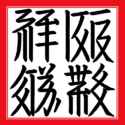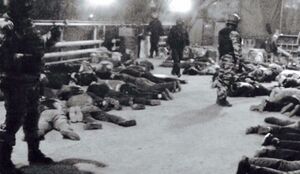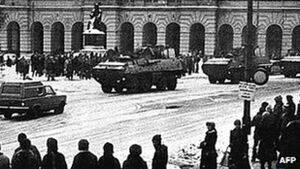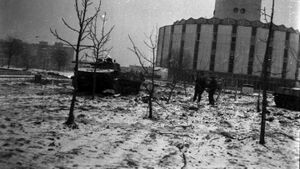Yakynda: Difference between revisions
No edit summary |
m (page inactive; removing tag) |
||
| (20 intermediate revisions by one other user not shown) | |||
| Line 1: | Line 1: | ||
{{Infobox country | {{Infobox country | ||
|native_name = ''Yakynda Halk Respublikasy'' | |native_name = ''Yakynda Halk Respublikasy'' | ||
| Line 7: | Line 5: | ||
|image_flag = File:Official_Flag_of_Syrian_Turkmen.jpg | |image_flag = File:Official_Flag_of_Syrian_Turkmen.jpg | ||
|image_coat = File:SelcukluKartali2.png | |image_coat = File:SelcukluKartali2.png | ||
|symbol_type = | |symbol_type = | ||
|national_motto = "Soon, soon" | |national_motto = "Soon, soon" | ||
|national_anthem = <!--''[[name of/link to anthem]]''--> | |national_anthem = <!--''[[name of/link to anthem]]''-->dasdadasd | ||
|royal_anthem = <!--''[[name of/link to anthem]]''--> | |royal_anthem = <!--''[[name of/link to anthem]]''--> adasdsa | ||
|other_symbol = ''Official Seal''<br>[[File:YakyndaSeal.png|125px]] | |||
|image_map = <!--e.g. LocationCountry.svg--> | |image_map = <!--e.g. LocationCountry.svg--> | ||
|alt_map = <!--alt text for map--> | |alt_map = <!--alt text for map--> | ||
| Line 16: | Line 15: | ||
|capital = | |capital = | ||
|largest_city = | |largest_city = | ||
|official_languages = | |official_languages = | ||
|regional_languages = | |regional_languages = | ||
|ethnic_groups = | |ethnic_groups = | ||
| Line 22: | Line 21: | ||
|government_type = {{wp|Unitary state|Unitary}} {{wp|Parliamentary system|parliamentary}} {{wp|republic}} under a {{wp|Military junta|military junta}} | |government_type = {{wp|Unitary state|Unitary}} {{wp|Parliamentary system|parliamentary}} {{wp|republic}} under a {{wp|Military junta|military junta}} | ||
|leader_title1 = President | |leader_title1 = President | ||
|leader_name1 = | |leader_name1 = None recognized | ||
|leader_title2 = Minister-president | |leader_title2 = Minister-president | ||
|leader_name2 = | |leader_name2 = Non recognized | ||
|legislature = Supreme People's Parliament | |legislature = Supreme People's Parliament | ||
(suspended) | (suspended) | ||
| Line 55: | Line 54: | ||
|calling_code = | |calling_code = | ||
}} | }} | ||
'''Yakynda''', officially the '''Yakynda People's Republic''' (''Yakynda Halk Respublikasy''), is | '''Yakynda''', officially the '''Yakynda People's Republic''' (''Yakynda Halk Respublikasy''), is an island country in (TBA). Located in Yakynda has maritime borders with [[Ausvalia]] to the east and [[Leth]] to the west. | ||
Yakynda is notable for its long nights and equally long sun durations. It experiences {{wp|polar night|polar nights}} that usually last for 2-4 weeks, depending on how far south one travels. In the extreme south, it could last for 1 to 2 months. | |||
==Etymology== | ==Etymology== | ||
==History== | ==History== | ||
===Origins=== | |||
The origin of the Yakyndans is disputed. Scientists suggest that the ancestors of the Yakyndans who currently inhabit the region to have descended from a temperate to sub-Arctic culture originating from the mainland which migrated and populated the area at around the xxxx Periodx, around the time when the migration of several related nomadic groups were at it's height. The descendants of the groups who settled in the islands were the only ones to survive the succeeding migrations that occurred that displaced and assimilated the proto-Yakyndan speakers on the mainland. Prior to the arrival of the proto-Yakyandans, several hunter-gatherer cultures were already present at the islands which were soon conquered and assimilated. Traces of their languages are seen in Yakyndan dialects, the most of which can be notably seen in the syntax of some Western Yakyndan dialects. | |||
[[File:File48610457 1ae7d7f0.jpg|thumb|right | xxx]] | |||
[[File:1582073474 1543197770167812359.jpg|thumb|right| arrest]] | |||
[[File:57850533 warsawafp.jpg|thumb|right| xxx]] | |||
[[File:35.jpg|thumb|right| xxx]] | |||
===Prehistory=== | |||
===Classical Yakynda=== | |||
===Dynastic Yakynda=== | |||
[[File:Jurchen_Jin_cavalry.png|1000px]] | |||
===Modernization and Centralization=== | |||
===Civil War=== | |||
===People's Republic of Jaqinda=== | |||
===Post-YRP Jaqinda=== | |||
After decades of one-party totalitarian rule, the ruling party, the Yakyndan Revolutionary Party and its leadership was overthrown on October 1986 by a violent revolution, dubbed the [[October Fall]]. It started in the city of [[Bo'ri]] ('Wolf' in Ovqat dialect) with a traditional street demonstration supporting the ancient tradition of raindeers and fishing. The people held fish alongside the white banners, which were also decorated with illustrations of fish. The officer in charge, unaware of the local customs and traditions mistakenly thought that it was an anti-government demonstration and gave the order to fire upon the crowd. | |||
This incident, known as the [[Tarahukun]] (Old Yakyndan: Anger Day) was quickly censored by the [[MHM]] although first-hand accounts and stories by family members made the incident known nationwide. Decrease in the popularity of the YRP government alongside frustration against the failing system quickly led to armed uprisings and takeovers of several towns and cities by local Yakyndan revolutionaries. Although the situation was being controlled by the Armed Forces in the early stages of the conflict, the tides soon changed as more Yakyndan military and National Police personnel defected en masse to the rebels. It ended with the dissolution and banning of the YRP and the [[Kuzatmoq]] secret police and the imprisonment and eventual [[mass executions of former state officials and YRP members by Yakyndan soldiers and Police]]. | |||
[[File:Lekcja-historii.jpg|thumb|right|Yakyndan Army preparing to retake several buildings from rioters in Yoldiz ]] | |||
Democracy was finally established on May 1988, and the first [[general elections]] were held on August 23. In the elections, the newly-formed [[Revival Party]] won a decisive victory over the other opposition parties, most of which weren't able to put up resistance or alternatives for their own campaigns. The opposition parties then decided to form a coalition, namely the Freedom coalition, and soon won half of the seats in the [[December parliamentary election]]. | |||
By 1989, the government became invested in a series of {{wp|Ponzi schemes|Ponzi}} [[schemes]], which was supported by vast financial and national resources. The schemes collapsed by January of 1990, leaving many businesses and investors bankrupt and causing both foreign and local investors to take to the streets to request for their money back. The protests quickly turned to riots in March, when the police started to use live ammunition against the protesting investors, leaving numerous fatalities and injuring several more. This in turn led to the burning and sacking of several government insitutions, in a scene which was described by foreign journalists as "reminiscent of how the medieval world looted castles, with people running out with all sorts of materials.". | |||
By April, it turned into open conflict and anarchy with protesters and criminal syndicates alike raiding and opening military facilities and police stations, looting what amounted to 450,000 small arms, 2,000,000 rounds of ammunition and 500,000 explosives worth of equipment. Uncontrollable rioting alongside the numerous desertions by the Yakyndan Air Force and Yakyndan Navy eventually led to the toppling of the government and the emergence of a stateless society. | |||
==Geography== | ==Geography== | ||
| Line 69: | Line 106: | ||
===Military=== | ===Military=== | ||
{{main|Yakyndan Armed Forces}} | |||
===Foreign Relations=== | ===Foreign Relations=== | ||
===Human Rights=== | |||
==Economy== | ==Economy== | ||
| Line 82: | Line 122: | ||
==Demographics== | ==Demographics== | ||
===Religion=== | ===Religion=== | ||
| Line 105: | Line 144: | ||
}} | }} | ||
The | ===Languages=== | ||
The official language of Yakynda is [[Yakyndan]], spoken by 98% of the population. Prior to the adoption of alphabetical scripts it used an indigenous logographic script known as the [[Mukaddes Yozuvi]]. It was used alongside the much simpler and popular [[Iyerogliflarni]]. During the Imperial era, the government mandated the creation and introduction of the Romanised [[Elipbizý alphabet]], which soon became widespread across all Yakyndan institutions. | |||
The standard dialect for Yakyndan is the [[Iýmit dialect]]. [[5 other dialects]] are also in use around the country, [[Ovqat]] and [[Gıda]] being the most spoken ones. | |||
===Education=== | |||
==Culture== | |||
====Music and Art==== | ====Music and Art==== | ||
Latest revision as of 12:13, 31 July 2023
Yakynda People's Republic Yakynda Halk Respublikasy | |
|---|---|
| Motto: "Soon, soon" | |
| Anthem: dasdadasd Royal anthem: adasdsa | |
Official Seal | |
| Demonym(s) |
|
| Government | Unitary parliamentary republic under a military junta |
• President | None recognized |
• Minister-president | Non recognized |
| Legislature | Supreme People's Parliament (suspended) |
| Population | |
• 2017 estimate | 2,900,000 |
| Currency | guilder (HZG) |
| Date format | dd-mm-yyyy |
| Driving side | right |
Yakynda, officially the Yakynda People's Republic (Yakynda Halk Respublikasy), is an island country in (TBA). Located in Yakynda has maritime borders with Ausvalia to the east and Leth to the west.
Yakynda is notable for its long nights and equally long sun durations. It experiences polar nights that usually last for 2-4 weeks, depending on how far south one travels. In the extreme south, it could last for 1 to 2 months.
Etymology
History
Origins
The origin of the Yakyndans is disputed. Scientists suggest that the ancestors of the Yakyndans who currently inhabit the region to have descended from a temperate to sub-Arctic culture originating from the mainland which migrated and populated the area at around the xxxx Periodx, around the time when the migration of several related nomadic groups were at it's height. The descendants of the groups who settled in the islands were the only ones to survive the succeeding migrations that occurred that displaced and assimilated the proto-Yakyndan speakers on the mainland. Prior to the arrival of the proto-Yakyandans, several hunter-gatherer cultures were already present at the islands which were soon conquered and assimilated. Traces of their languages are seen in Yakyndan dialects, the most of which can be notably seen in the syntax of some Western Yakyndan dialects.
Prehistory
Classical Yakynda
Dynastic Yakynda
Modernization and Centralization
Civil War
People's Republic of Jaqinda
Post-YRP Jaqinda
After decades of one-party totalitarian rule, the ruling party, the Yakyndan Revolutionary Party and its leadership was overthrown on October 1986 by a violent revolution, dubbed the October Fall. It started in the city of Bo'ri ('Wolf' in Ovqat dialect) with a traditional street demonstration supporting the ancient tradition of raindeers and fishing. The people held fish alongside the white banners, which were also decorated with illustrations of fish. The officer in charge, unaware of the local customs and traditions mistakenly thought that it was an anti-government demonstration and gave the order to fire upon the crowd.
This incident, known as the Tarahukun (Old Yakyndan: Anger Day) was quickly censored by the MHM although first-hand accounts and stories by family members made the incident known nationwide. Decrease in the popularity of the YRP government alongside frustration against the failing system quickly led to armed uprisings and takeovers of several towns and cities by local Yakyndan revolutionaries. Although the situation was being controlled by the Armed Forces in the early stages of the conflict, the tides soon changed as more Yakyndan military and National Police personnel defected en masse to the rebels. It ended with the dissolution and banning of the YRP and the Kuzatmoq secret police and the imprisonment and eventual mass executions of former state officials and YRP members by Yakyndan soldiers and Police.
Democracy was finally established on May 1988, and the first general elections were held on August 23. In the elections, the newly-formed Revival Party won a decisive victory over the other opposition parties, most of which weren't able to put up resistance or alternatives for their own campaigns. The opposition parties then decided to form a coalition, namely the Freedom coalition, and soon won half of the seats in the December parliamentary election.
By 1989, the government became invested in a series of Ponzi schemes, which was supported by vast financial and national resources. The schemes collapsed by January of 1990, leaving many businesses and investors bankrupt and causing both foreign and local investors to take to the streets to request for their money back. The protests quickly turned to riots in March, when the police started to use live ammunition against the protesting investors, leaving numerous fatalities and injuring several more. This in turn led to the burning and sacking of several government insitutions, in a scene which was described by foreign journalists as "reminiscent of how the medieval world looted castles, with people running out with all sorts of materials.".
By April, it turned into open conflict and anarchy with protesters and criminal syndicates alike raiding and opening military facilities and police stations, looting what amounted to 450,000 small arms, 2,000,000 rounds of ammunition and 500,000 explosives worth of equipment. Uncontrollable rioting alongside the numerous desertions by the Yakyndan Air Force and Yakyndan Navy eventually led to the toppling of the government and the emergence of a stateless society.
Geography
Climate
Environment
Politics and Government
Military
Foreign Relations
Human Rights
Economy
Industry
Infrastructure
Transport
Demographics
Religion
Languages
The official language of Yakynda is Yakyndan, spoken by 98% of the population. Prior to the adoption of alphabetical scripts it used an indigenous logographic script known as the Mukaddes Yozuvi. It was used alongside the much simpler and popular Iyerogliflarni. During the Imperial era, the government mandated the creation and introduction of the Romanised Elipbizý alphabet, which soon became widespread across all Yakyndan institutions.
The standard dialect for Yakyndan is the Iýmit dialect. 5 other dialects are also in use around the country, Ovqat and Gıda being the most spoken ones.






